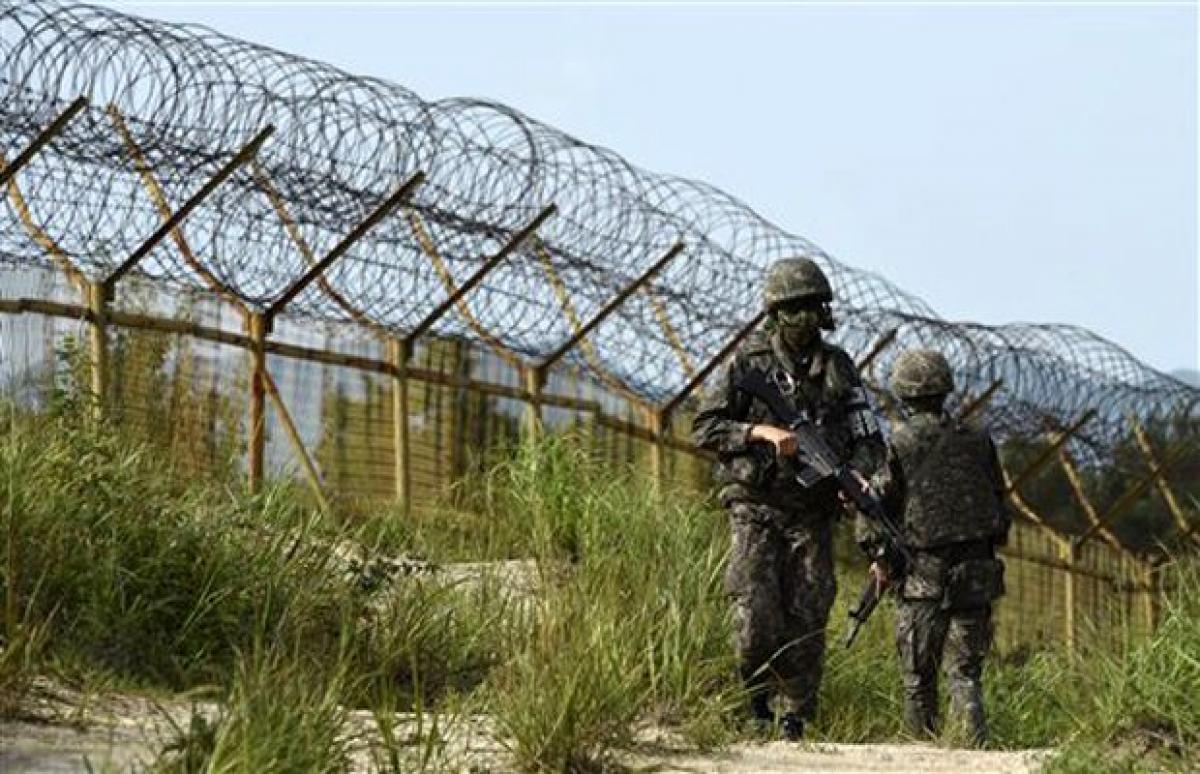Live
- Air quality in Kolkata dips to ‘very unhealthy’ category
- Air pollution may raise risk of lung cancer, asthma in children, say experts
- Yashoda Medicity organizes “Crown of Courage” ceremony to honor Cancer Survivors
- NCB, Gujarat ATS seize 500 Kg of drugs in joint op in Porbandar
- Senior citizens of all states to get 25pc bus fare concession in Andhra
- India’s total exports likely to surpass $800 billion in coming months: Industry
- Almost half of injury-related hospitalisations in Australia caused by falls: Report
- Tribals ignored by past regimes, remain top priority in NDA govt: PM Modi in Jamui
- South Korea: Opposition leader sentenced to suspended prison term for violating election law
- Ajinkya Rahane to lead Mumbai in Syed Mushtaq Ali Trophy
Just In

x
Highlights
Tens of thousands of South Korean and US troops kicked off a large-scale military exercise Monday simulating an all-out attack by North Korea, which has condemned the joint drill as a \"declaration of war.\"
Tens of thousands of South Korean and US troops kicked off a large-scale military exercise Monday simulating an all-out attack by North Korea, which has condemned the joint drill as a "declaration of war."
.jpg)
The annual Ulchi Freedom exercise, which the defence ministry said would run through August 28, is largely computer-simulated, but still involves 50,000 Korean and 30,000 US soldiers.
The drill plays out a full-scale invasion scenario by nuclear-armed North Korea and both Seoul and Washington insist it remains purely defensive in nature.
Pyongyang views Ulchi Freedom -- along with other annual South Korea-US drills -- as wilfully provocative and has threatened the "strongest military counter-action" should this year's exercise go ahead.
"Such large-scale joint military exercises... are little short of a declaration of a war," the North's Committee for the Peaceful Reunification of Korea, which oversees cross-border issues, said last week.
The committee specifically warned of the drill's potential for an accidental military clash that could trigger an "all-out" conflict.
Military tensions are already running high along the Korean peninsula after South Korea blamed the North for mine blasts that maimed members of a border patrol earlier this month.
The South retaliated by resuming high-decibel propaganda broadcasts across the border, using batteries of loudspeakers that had lain silent for more than a decade.
Threats of retaliation
North Korea has denied any involvement and, at the weekend, threatened "indiscriminate" strikes against South Korean border units unless the broadcasts are halted immediately.
According to the South's defence ministry, this year's Ulchi Freedom drill will place a particular emphasis on reconnaissance and intelligence assets to strengthen monitoring of the heavily-militarised frontier.
The rising tensions were expected to top the agenda of a National Security Council convened and chaired Monday morning by President Park Geun-Hye.
In a speech to mark the anniversary Saturday of the Korean peninsula's 1945 liberation from Japanese rule, Park described the landmine attack as a serious breach of the armistice that ended the 1950-53 Korean War, and vowed a tough response to any further provocation by the North.
"North Korea must wake up from its daydream that it can maintain its regime through provocations and threats ... these will only lead to isolation and destruction," Park said.
Because the 1953 armistice was never replaced by a full peace treaty, the two Koreas technically remain at war.
The 70th anniversary of liberation was celebrated by both Koreas, and there had been hopes earlier this year that the event might offer the opportunity for some diplomatic fence building.
Instead, the last few months have seen cross-border ties caught in a downward spiral, accompanied by the all-too familiar rhetoric of mutual recrimination.
The North has also targeted the US with its verbal broadsides, brandishing its nuclear arsenal with threats of retaliation over Ulchi Freedom.
The powerful National Defence Commission stressed that North Korea had moved beyond the limits of conventional warfare.
The North is now an "invincible power equipped with both latest offensive and defensive means ... including nuclear deterrence," the commission said, adding that only by dropping its "hostile" policies against North Korea could the US "ensure the security of its mainland."

Next Story
More Stories
ADVERTISEMENT
© 2024 Hyderabad Media House Limited/The Hans India. All rights reserved. Powered by hocalwire.com







